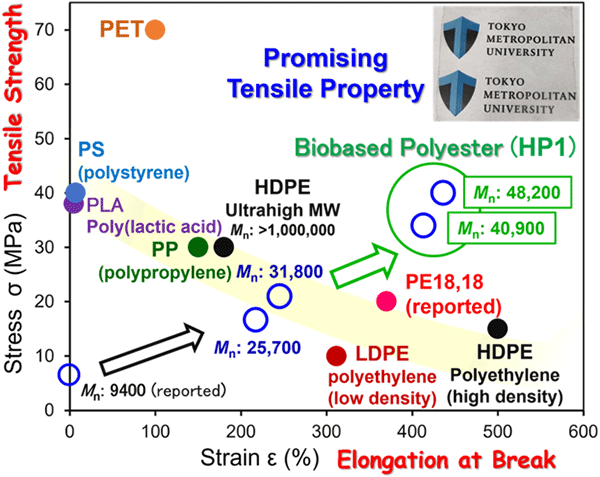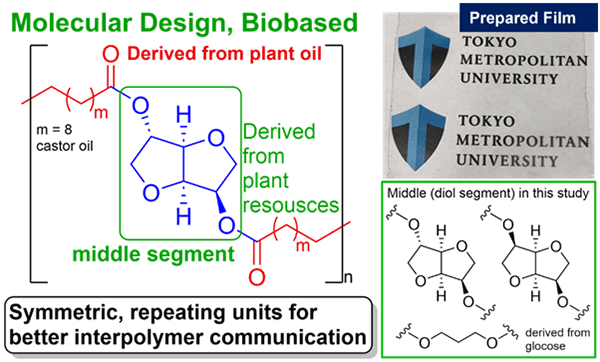The research group of Professor Kotohiro Nomura, Tokyo Metropolitan University, in cooperation with the research group of Director Hiroshi Hirano, Osaka Research Institute of Industrial Science and Technology, has developed biobased polyesters from inedible plant resources, which can be easily chemical recyclable and exhibit promising mechanical properties in film than commodity plastics.
The development of high-performance sustainable, recyclable plastics is an important subject to realize circular economy. Biobased polyesters made from plant resources are expected to become promising alternative materials to commodity polymers such as polyethylene and polypropylene produced from petroleum. However, there have been few examples of the development of high-performance materials that exceed required mechanical properties such as tensile strength and elongation at break.
Synthesis methods for high molecular weight (long chain) polymers had been a pending issue in conventional polycondensation methods. To solve this issue, the research group has developed an olefin metathesis polymerization method* using a high-performance molybdenum catalyst, focusing on polyesters derived from inedible plant resources, glucose and so forth. In general, there is an antinomic relationship between tensile strength and elongation at break in polymer film, as well as increase in molecular weight and elongation at break. However, the present polymer film demonstrates that the tensile properties (strength and elongation at break) of the polymer film increased with the molecular weight, exhibiting superior properties beyond conventional plastics.
The present result is the first success in developing the biobased polyester materials that can be decomposed/recycled and has excellent tensile strength and elongation at break than commodity plastics. The film properties can be further improved by combination with naturally derived fibers such as cellulose nanofibers. Therefore, the material is expected to be a large breakthrough in the research and development of plastic materials aiming at the circular economy.
* Olefin metathesis polymerization method
"olefin" is a general term for hydrocarbons with one carbon-carbon double bond. The word “metathesis” means “substitution”. Therefore, the recombination reaction of substituents on the double bond of an olefin is called the olefin metathesis reaction. For example, there is a reaction where a carbon-carbon double bond in an olefin is replaced with a catalytic metal-carbon double bond (catalytically active species) through the reaction using a catalytic metal such as ruthenium or molybdenum. The polymer synthesis method using such reaction is called the olefin metathesis polymerization method. The present method is a polycondensation synthesizing polymer through producing ethylene as by-product (acyclic diene metathesis polymerization).
-

Figure 1:Promising Mechanical Properties in the Present Biobased Polyesters Beyond Polyethylene Effect of molecular weight toward tensile properties in the present biobased polyesters, HP1. The plots of PE-18,18 (polyester-18,18, reported biobased), and commercially available polyethylene terephthalate (PET), poly(lactic acid) (PLA), high-density polyethylene (HDPE), low-density polyethylene (LDPE), polypropylene (PP), and polystyrene (PS) are placed for comparison. In general, polymer films exhibiting higher tensile strength (with increase of molecular weight) tends to decrease the elongation at break. The present high molecular weight biobased polyester (HP1), achieved in this study, shows promising tensile properties (tensile strength, elongation at break) beyond commodity plastics. The success was enabled by synthesis of high molecular weight polymers by high performance molecular catalyst. ©JST
-

Figure 2: Basic design, structure of present biobased polyesters Basic structure, framework in the present biobased polyesters derived from plant oil and glucose (in this study). The present polymers can be easily decomposed to the monomer units by chemical recycle simply using treating with alcohols (called catalytic transesterification). ©JST
Program Information
- JST CREST
- Research Area “Precise Material Science for Degradation and Stability”
- Research Theme “Development of Bio-Based Advanced Polymers and their Depolymerization, Chemical Recycle”
Journal Information
Mika Kojima, Xiuxiu Wang, Lance O’Hari P. Go, Ryoji Makino, Yuichi Matsumoto, Daisuke Shimoyama, Mohamed Mehawed Abdellatif, Joji Kadota, Seiji Higashi, Hiroshi Hirano, and Kotohiro Nomura, “Synthesis of High Molecular Weight Biobased Aliphatic Polyesters Exhibiting Tensile Properties Beyond Polyethylene”, ACS Macro Letters. Published online October 4, 2023, doi: 10.1021/acsmacrolett.3c00481
Contact
-
[About Research]
Kotohiro Nomura
Department of Chemistry, Tokyo Metropolitan University
Tel:+81-42-677-2547
E-mail: ktnomuratmu.ac.jp
-
[About Program]
Yusuke Ando
Department of Strategic Basic Research, JST
E-mail: crestjst.go.jp
